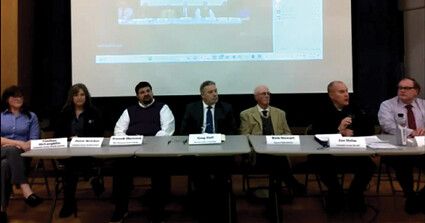Powerful illicit opioid impacts community, U.S. and world
May 11, 2023

- Submitted photo
Speaking at the panel discussion and forum on fentanyl were, from left, Lindsay Michaelson and Dawn Meicher, ARNP, both of the Columbia County Health System, Everett Maroon, Executive Director of Blue Mountain Heart to Heart; Greg Hall, SUD Therapist, Blue Mountain Counseling; Rich Steward, superintendent, Dayton School District; Sheriff Joe Helm and C. Dale Slack, Prosecuting Attorney.
DAYTON–The synthetic pain medication fentanyl and its far-reaching impacts into society, not only in the United States, but here in Dayton and Columbia County, were explored by a panel at Dayton Elementary on May 4. Discussion ranged from characteristics of fentanyl, its efficacy, factors among medical professionals, impacts on those involved in the drug culture, statistics on overdose deaths, treatment, effects on local education system and the community, and perspectives from law enforcement's and prosecution's points of view.
Neighbors United for Progress sponsored the forum and member Amy Rosenberg introduced the panel, hoping that people might learn about "a topic that's relevant to the community and something that there's not a lot of information out there about."
Fentanyl is a potent synthetic opioid analgesic that is similar to morphine but from 50 to 100 times more potent. Illicit fentanyl is entering the country primarily from Mexico and, because of Washington's Blake Decision, which essentially legalizes possession of narcotics, cartels are focusing on our state as a primary entry point.
"Four out of ten pills will kill you, no matter how much you take," said Lindsay Michaelson of the Columbia County Health System. It may be combined with a veterinarian-grade anesthetic xylazine, which the overdose blocker Narcan doesn't affect, she said.
Education is paramount, Michaelson said, as fentanyl may be in street drugs without the user's knowledge. "You want to follow the instructions on the box of Narcan but while you're doing other things, mainly while you're calling 911," she said. "Kids should also know the Good Samaritan law. You are not going to get in trouble if you call 911, and neither is your friend."
Dawn Meicher, ARNP, also with CCHS, started her career as a registered nurse in 1980, in intensive care, where pain medications were liberally administered. Doctors are now reducing use of opioids, she said, and have been for some time. The more opiates are used, the more opiate receptors in the brain are filled, reducing effectiveness. "It's hard to get patients off pain meds."
The organization Blue Mountain Heart to Heart, under Executive Director Everett Maroon, serves individuals who are using drugs. "We work on that trust relationship with people who are already going down that road of Opioid Abuse Disorder or Stimulant Abuse Disorder," Maroon said.
People engaged with the organization are five times less likely to overdose, and five times more likely to get into treatment, he said.
Heart to Heart operates a mobile clinic which visits Waitsburg, Dayton, Pomeroy, Clarkston, St. John, Burbank and Prescott, offering "low-barrier treatment programs." The mobile clinic includes a doctor, a nurse, a social worker and an in-house therapist. "We talk about trauma," he said. "Sometimes the trauma preceded the drug use, sometimes the trauma is because of drug use."
Maroon said Heart to Heart provides injectable Nalaxone and nasal Narcan. "Two doses of Narcan is enough to reverse 98% of overdoses," he said.
"My main concern is the age of people coming into contact with fentanyl and then not surviving," he said. "We're a little bit further down the line from prevention. We're trying to steer people back to changing their use, reducing their use, getting into treatment–longer-term solutions."
Greg Hall is a Substance Use Disorder (SUD) therapist at Blue Mountain Counseling.
"I'm all about prevention," he said, "but when you cross the line into addiction, that's where people like me come into play. Hopefully we can meet them where they're at.
"Everyone is 'somebody's somebody' right" he asked. "That's why it's so important."
School Superintendent Rich Stewart said the school's focus is also prevention, and recently received its first shipment of Narcan. The opioid antagonist will be strategically placed around campus, and personnel will be trained to administer it.
The District has also hired a mental health counselor. "Our goal is to have great mental health," Stewart said, "to prevent them from self medicating and help them make good decisions."
Sheriff Joe Helm said his office's responsibility pertains to the criminal aspect of illicit drugs, and attempts to balance prevention with enforcement. "If we can prevent someone from coming to jail, it's better for them, it's better for us, it's better for the community," he said.
The pursuit of drugs drives a lot of lower-level crimes, he noted.
The Sheriff's Office supports the goals of the Coalition for Youth and Families, which recently spearheaded a Drug Take Back Day and is hosting the program, Hidden in Plain Sight, which shows the uninitiated how drugs and paraphernalia are disguised.
As a law enforcement officer, Helm said criminals have to be held responsible and face consequences, but the Blake Decision has made it legal to possess narcotics, Helm said.
"I believe in that accountability but there isn't anything as far as enforcement," he said.
Helm said people can possess fentanyl and cocaine, and he can take the drugs from the individual, but would have to refer the suspect to treatment the first two times. The third time, he said, he can make an arrest. The issue now is there's no state database to tell if someone has had a referral.
Fentanyl is coming into Washington in "heavy, heavy droves," Helm said, "because our state has lax drug laws." Two major cartels focusing on Washington State.
Helm described what a lethal dose of fentanyl may look like: depending on a person's tolerance, 10 to 15 grains the size of salt is a lethal dose.
How offenders are dealt with in the judicial system has changed 180 degrees from when County Prosecutor Slack started his career, first as a public defender, now as a prosecutor.
Slack not only prosecutes offenders, in this small county, he is the coroner. He noted that there has been one overdose death in Columbia County this year.
"You're going to hear some very different statistics from each of us," Slack said. "There's a reason for that. It depends on what week you look at the statistics. They have been spiking so, so precipitously that if you look at the statistics from January and then you look up the statistics today, you're going to get way different numbers."
Prior to the Blake Decision, a person would get picked up, get charged with a felony, would plead to a felony, and if they were lucky, the prosecutor would recommend a lower sentence, or suspended sentence, Slack said.
Slack described three stages of how people treat drug abuse: demonization, compassionate acceptance and enabling.
Demonization portrays people who use drugs because they are weak, who are bad people, who can't cope with life and who need whipped into shape. "We will just make them come on board with the rest of us," he said. "That is not true."
Slack recounted an anecdote about an individual who worked in construction, had just started a new job, was in line for a raise and promotion, but hurt his back. He knew going to the doctor and getting put on leave would hinder his chances for promotion, possibly result in being fired. So he took opioids to treat the pain and it became 'an everyday thing.' He was using those drugs to be that hard worker. He was not rare."
Compassionate acceptance is where we should be, Slack said. On the other side is enabling.
"The other side of that line is 'yeah, you use drugs and far be it for me to tell you you're a bad person for doing that, and so I'm going to let you just go on with your life, go ahead, just go and camp out on the street corners, do meth in your tent there, that's really your choice,'" Slack said. "That's not a good idea, either."
In certain parts of the state, if you looked hard, you can see a lot of enabling going on, Slack said.
Compassionate acceptance acknowledges the individual has a problem, offers help, helps the person "get on their feet, stop using drugs and go forward with life in a healthy way," he said.
State funding is available to implement a community-driven program that permits counties to tailor how addicted persons are helped.
Slack said they're hoping to take the lower-level crimes they see, take some of the police encounters that Helm and his deputies have with people having problems, and be able to do something. "And put a wedge in the door and say 'Look. You are headed down the road that you are not going to do well. We have a program just for you and we have services for you. And you need to take advantage of those now before it becomes the other side of that door,'" Slack said.
One thing he is worried about is people thinking a drug-diversion program is a softball approach, or a touchy-feelie thing.
"It is not," he said. "When people sign up, they'll have appointments to make so they can keep in the program. They're going to have obligations and responsibilities they have to meet. If they don't, guess what's going to happen? Somebody will knock on their door and say 'Hey, you've got a counseling appointment' or someone will come by their house, 'Hey, you didn't turn in those housing vouchers.'
"We will help people," Slack said. "We are holding them accountable. People who are putting that pressure on them to do the best for themselves."








